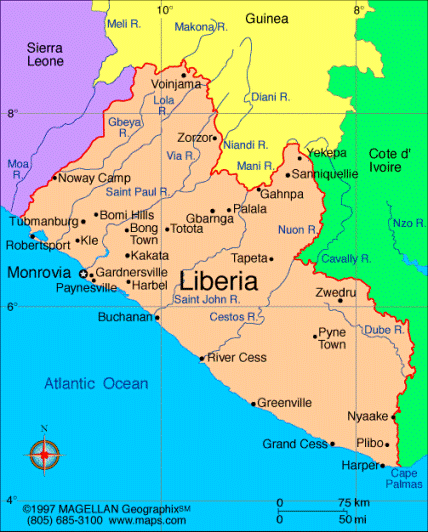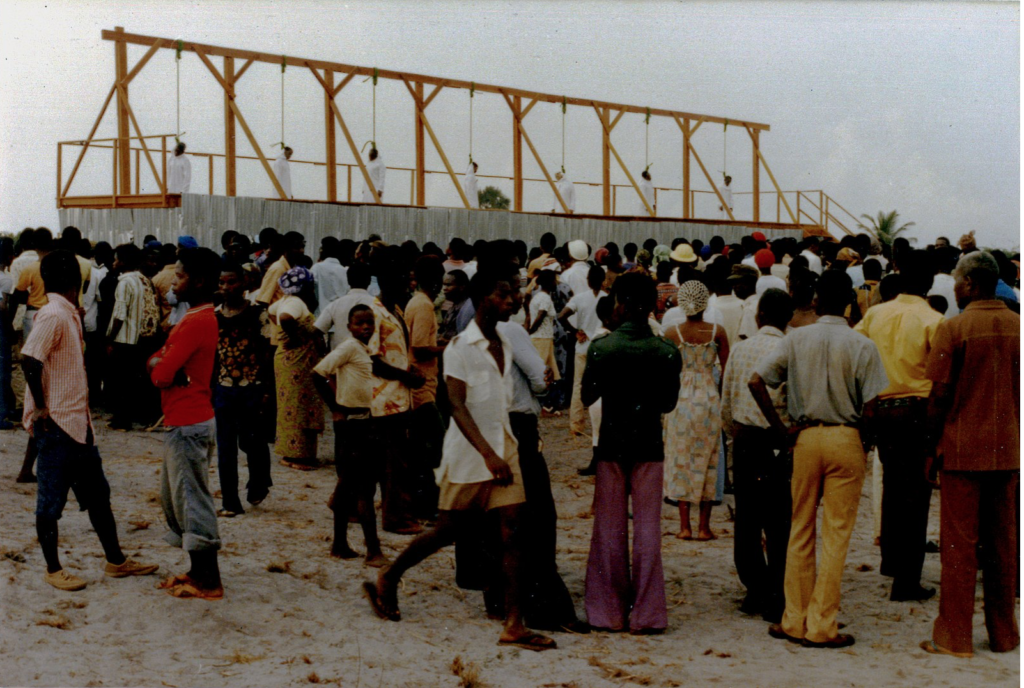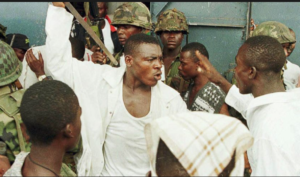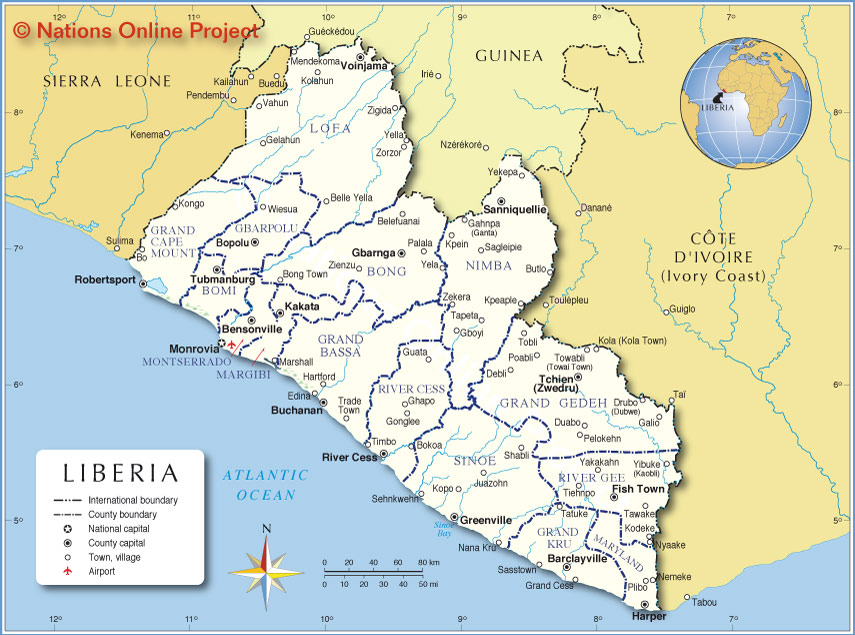As is clear from the article below, all Liberian presidents including William Tubman, William Tolbert, Samuel Doe, Charles Taylor, Ellen Johnson-Sirleaf as well as other political leaders are aware of the occurrence of ritual murders in the country, notably during election campaigns. It is even whispered that some presidents had a more than passive role in this respect but these – sometimes persistent – rumors have never been confirmed or proven.
The author, Melvin Pyne, presents an astonishing – sketchy – overview of ritualistic murders from the 1960s onwards hence covering a period of over half a century.
He hasn’t mentioned them all. Certain cases have never been discovered. The thick Liberian forests hide many ritual murder crimes, I am very sure about this harsh reality, though without having proof of it. Nevertheless I am pretty sure that many people in Liberia will confirm this ‘gut feeling’ of mine (webmaster FVDK).
The Liberian government must take charge of our security, or else…

Published: January 17, 2022
By: Melvin D. Weh – Front Page Africa
Last year ended on a rather low note for many Liberians with the wave of alleged ritualistic, serial killings which instilled fear across the country. Communities and residents were on the brink of paranoia. Thus is upsetting the way of life for everyone.
Liberian history tells us that such killings have happened in the past. In the 60s and 70s, Gboyos (Heartmen) ravaged the southeastern parts of the country. Gboyos were a feared society that allegedly wore top hats, black suits, and captured people for ritualistic purposes. They took body parts, especially the hearts of their victims, thus earning them the nickname, Heartmen. The situation was so bad that the citizens pressured the government to act.
In 1979, the administration of President William Tolbert, took action. It investigated and convicted seven individuals including top government officials who were involved in the ritualistic murder of Mr. Moses Tweh in Harper, Maryland County. The court, after hearing the case, established a precedent. They handed down the verdict of guilty. The convicts were sentenced to death and subsequently executed publicly in Harper. Amongst those executed were James Anderson, Superintendent of Maryland County, Allen Yancy, representative of Maryland County and Philip B. Seyton, Senior Inspector of the Ministry of Commerce, Maryland County. This deterrent action practically slowed the act.
Years later in 1989, President Samuel Doe’s administration tried and convicted Defense Minister Maj. General Gray D. Allison and his wife Mrs. Angeline Watta Allison for the ritual murder of a police officer, J. Melvin Pyne in the Caldwell community. Gen. Allison was tried under the Uniform Code of Military Justice (UCMJ) at a military tribunal, found guilty and sent to Belleh Yalla, the maximum-security prison in Lofa County. His wife was convicted at ‘Criminal Court C’, and sentenced to life imprisonment according to the Mr. Max Dennis, son of Mrs. Allison.
See: PYJ Hunted As Int’l War Crimes Investigators Arrive In Monrovia – Hot Pepper Releases More On How He Murdered Gray Allison And Wife (published August 12, 2015)
Allison was the most renowned government official convicted during the Doe regime. However, it is reported that an aide to president Doe, Mr. David K. Clarke and five others were tried, convicted and executed for the ritual murder of two little boys in 1987.
See: Ritual killings brings arrest of 6 Liberians (published May 4, 1987; New York Times).
Also: Ritual killings continue to be a plague (Part III, ‘Liberia Past and Present’; webmaster FVDK))
And: Ritual killing laid to Liberian Official (published August 15, 1989; New York Times)
Liberia: Prince Johnson sentenced my mother to death – Watta Allison’s son breaks silence (published June 28, 2018, FP Africa)
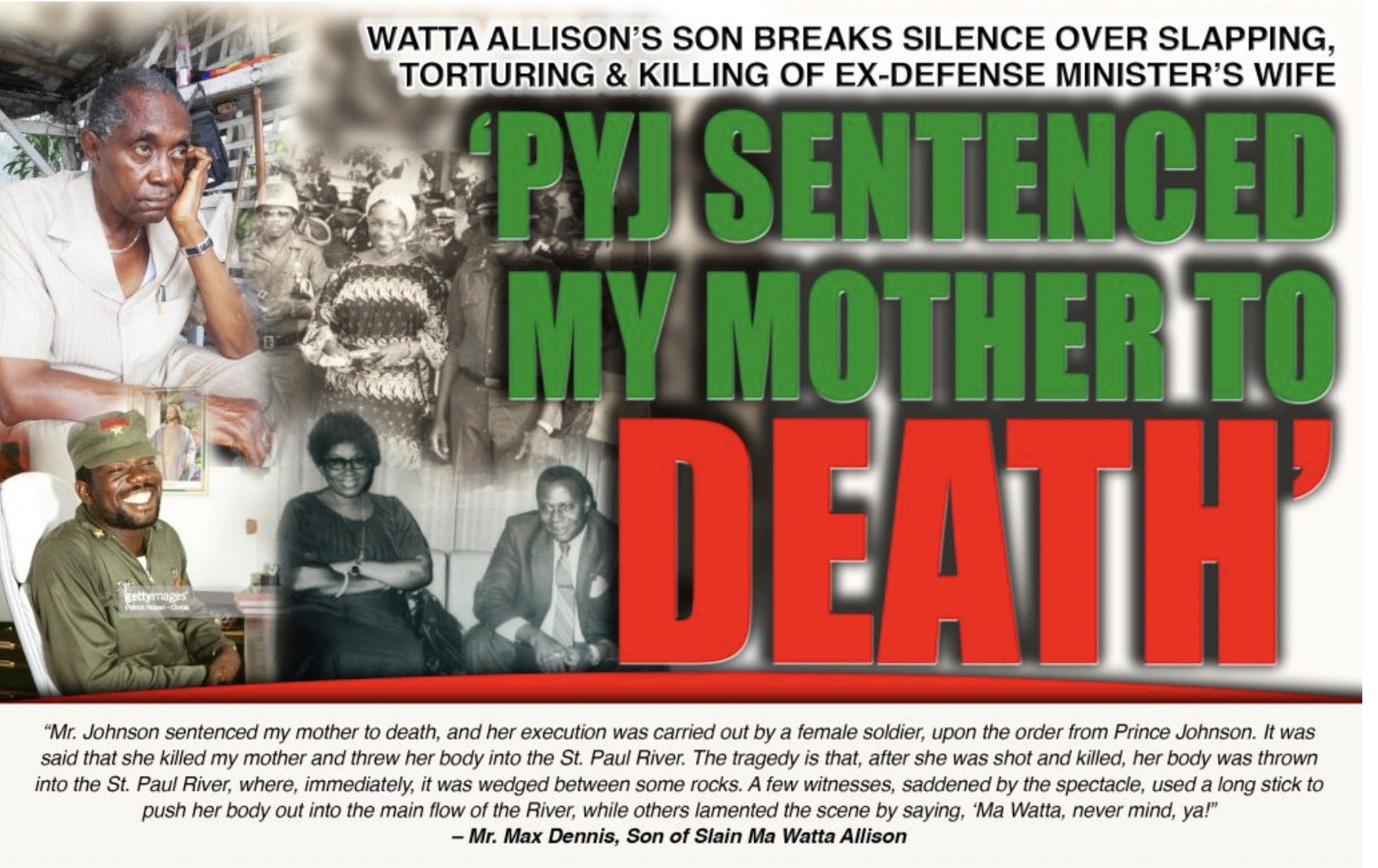
During the war years and President Taylor’s administration, there were rumors of murders for ‘Juju’ purposes. We must note that those were years of injustice and arbitrary justice, therefore there is not much record on how those cases were legally handled. Men in arms allegedly conducted speedy quasi-investigations and punished alleged perpetrators, wrongly too. Serious attention was not placed on the issues perhaps because killings were almost the norm, sadly.
On 29 June 2005 before the special general elections, there were reports of ritualistic killings almost across the country. The interim leader, Gyude Bryant warned that candidates tempted to boost their chances by carrying out human sacrifices will be executed if caught. While no one was successfully tried and convicted, Mr. Bryant’s warning seemed to have eased the situation for sometimes, as it was observed. ( BBC News, 29 June 2005)
In 2017 during the reign of President Ellen Johnson-Sirleaf, protesters (women in majority) stormed Gbarnga City in demand of answers to over series of young women including 12 years old girl who were seen dead with missing body parts. The women of the county under the banner Bong Women Association and the Bong Christian Association marched in the streets demanding more actions from the government in addressing such monstrous crimes.
See: Vote-Rich Liberian County Protests Election Year Ritualistic Killings (published August 15, 2017, Front Page Africa)
Another notable case of ritual killing was the murder of seventeen years old Cyrus Yeawonyee in September 2015 in the suburb of the commercial city of Ganta. Cyrus was killed and body parts including eyes, ears and tongue were extracted according to report. Cyrus’ convicted killer was another teenager, Jacob Vambo who was sentenced to life in prison in February 2016. Vambo confessed to luring his friend Cyrus into the trap of powerful muscular men who allegedly killed him for a well-connected government official. His claims of the involvement of others in the killing could not be authenticated to punish those he had accused.
However, his lawyer (a Public Defendant) Cllr. Mewaseh Payebayee (late) and some observers believed his claims as they felt such a lanky looking child was incapable of overpowering someone and committing such gruesome murder.
A day after the investigation into Cyrus’ murder case by the Liberia National Police-LNP on 29th September 2015, Ganta experienced one of the most violent disruptions since the civil war. This time, it was a motorcyclist. The news of Cyrus killing was gradually fueling tension when the young man was discovered dead with blood allegedly drained from his body for the wealthy businessperson. Though, investigation disproved the allegation of ritual killing and established that the killing happened as a result of robbery, the damage was done. The popular Alvino Hotel in the City was looted and burned while two persons were reported dead, among the many damages done. About fifty arrests were made in connection to the riot.
While a teenager is convicted of a gruesome killing, questions linger about occult violence among the power elite. By Ashoka Mokpo
Click on image to access article
With such history, it is no surprise why the public will be alarmed if there is a rearing up of such activities. The FrontPage Africa News Paper September 23, 2021 edition reported the alleged murder of John Tubman at his residence with deep cuts in the neck. John was the son of Liberia’s longest serving president William V.S. Tubman. Barely a month later, the death was reported of the renowned Rev. William Richard Tolbert, III, a peace ambassador and son of another former president, William Richard Tolbert, Jr. then, a Madam Maude Elliot of the Liberia Immigration Services (LIS) was also found dead. Both were murdered in their respective homes in similar conditions.
Additionally, amongst many others, the FrontPage Africa newspaper published on November 8, 2021 a list of several murders all of which occurred this year alone with victims displaying similar conditions. On that list was Jane Doe (Unidentified Woman) found on 17th Street Beach (September); Mordecai Nyemah (May), Florence Massaquoi (February), as well as, Robert M. Blamo, Jr., Bobby S. Gbeanquoi, and Siafa G. Boimah.
While last year, amidst the global Covid-19 pandemic, several other killings occurred- Elijah Polumah, Abraham Tumay, and George B. Fanbutu, mentioning a few.
But most troubling of all this were two separate incidents. First, is a statement by President George Weah in November, when he signed the book of condolence for the late Mr. Emmanuel Barten Nyenswa. Mr. Weah is on record urging citizens and residents to install at their premises, Closed Circuit Television (CCTV) Cameras. He pointed out that government’s focus of security was on the country’s borders. Mr. Nyensuah’s death like three other auditors from the Liberia Revenue Authority (LRA) is still being investigated. Many believe their deaths were for political reasons or cover up for some malpractices they may have uncovered.
Mr. Weah is either unaware of the financial hardship in the country or does not care much about the innocent lives being lost. A people that can barely afford, how does he expect them to buy CCTVs that cost $1000 USD at a minimum? With many parts of the city out of electricity, how does he expect the cameras to work?
The second concerning issue is the remark made by the Liberia National Police Inspector General, Col. Patrick Sudue at Ministry of Information Cultural Affairs and Tourism (MICAT) press conference. Col. Sudue alleged that the news of serial and ritualistic killings in Monrovia and other parts of the country were fake stories being created by opposition politicians who want to implant fear and give negative image of the country and malign government’s reputation.
The IG’s statement on these recent issues suggests a political posturing. While Col. Sudue is a political appointee, the office of the Inspector General needs to be apolitical and professional, always endeavoring to maintain the integrity and independence of the Liberia National Police.
In midst of this scaring security situation, such comments undermine the confidence of the people in the government and the ability of the Liberian National Police to combat these criminal acts.
Such levels of insecurities lead to several dire consequences. Those who can afford, would now take the law into their own hands, those who can’t might find other means not necessarily legal. Are we to now become a lawless society? Then, there is the investment angle. It doesn’t present a secured environment for investors. They could then leave the country and with them other citizens and residents out of fear would flee the country. Investors (local and international) do shy away from investing due to insecurity and lack of justice. When investors do not invest, economically the country is affected as unemployment increases. Government incomes (personal and corporate income taxes are lost. Aggrieved citizens usually take mob justice as the only alternative. These amongst many negative reactions are recipes for chaos and anarchy.
The questions now are: what can be done here to change the atmosphere of fear? And how can we do it?
To these questions considering the preceding, the government is under obligation to protect the lives of those residing in the country. To ensure that the citizens do not regret electing the current administration, she has to act, and do it now. To avoid mob justice, the government must take charge of matters immediately. To avoid fleeing of citizens and other residents from the country, the government must muster the courage to dig deep into these happenings and punish perpetrators. To ensure current and potential investors that their lives and properties will be protected here, the government must change gear and expedite investigations into these matters.
In closing, while these acts have happened in the past, the onus is always on the government to fight them and protect the people. The Liberian National Police has to step-up, take control of the security, and avoid becoming political in handling these issues.
Source: The Liberian Government Must Take Charge Of Our Security, Or Else…
